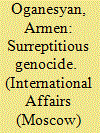| Srl | Item |
| 1 |
ID:
144453


|
|
|
|
|
| Summary/Abstract |
How do religious civil wars evolve? Many violent conflicts are fought between groups of different faiths. The paper argues, however, that religious differences rarely directly lead to conflict onset. Rather, the apparent religious dimension of many civil wars is a consequence of successful religious framing. Political and military leaders offer religious interpretations designed to legitimize the use of force and to mobilize believers to violent action. Such framing processes can be more or less successful, depending inter alia on the authority of the political and religious leadership, on the coherence and appropriateness of the frames, on the existence of persuasive counter-frames, and on the availability of communication infrastructures that allow for effective dissemination of religious frames. Comparing violent conflicts in the Philippines and Thailand, the paper shows that religious mobilization can fail along the theoretically predicted lines.
|
|
|
|
|
|
|
|
|
|
|
|
|
|
|
|
| 2 |
ID:
120725


|
|
|
|
|
| Publication |
2013.
|
| Summary/Abstract |
As Muslim communities reassert themselves in public life across the world, including Central Asia, their actions are causing tension in relations with 'secular' governments. Various global theories have been offered to explain these dynamics. According to one theory, tension between religious communities and secular states is caused by the exclusion or marginalization of Muslims, a process exacerbated by the perceived anti-Muslim bias in the foreign- and domestic-security policies of Central Asian states. A second view is that tension results from the work of global extremist groups espousing the restoration of an Islamic Caliphate. The third approach presents the rising tension as part of a broader trend: a putative clash of Western and Muslim civilizations. This article challenges these theories by using a case study of a Muslim grassroots protest in Kyrgyzstan to highlight the importance of local politics, namely informal arrangements among local officials, power brokers and community members. In so doing, it seeks to make a contribution to theorizing Muslim-state relations in Central Asia.
|
|
|
|
|
|
|
|
|
|
|
|
|
|
|
|
| 3 |
ID:
117375


|
|
|
|
|
| Publication |
2012.
|
| Summary/Abstract |
TODAY, THE MASS MEDIA all over the world, Russia being no exception, are very much concerned with the relations between religion and the state.
Foreign Affairs, a respectable thick journal, writes about new trends in the United States where disagreements between the Catholics and Protestants are no longer the talk of the day; confrontation between the conservative believers and secular progressivists has become the public's staple topic.
This is a renaissance of sorts: in the United States the current extent of party-based religious mobilization has been unknown since the mid-19th century.
|
|
|
|
|
|
|
|
|
|
|
|
|
|
|
|